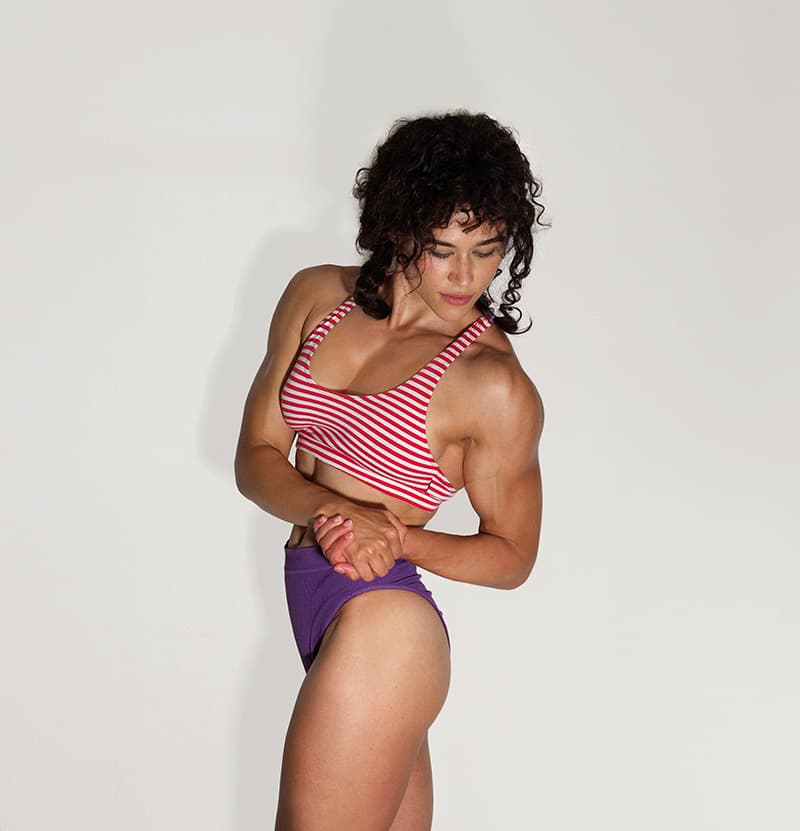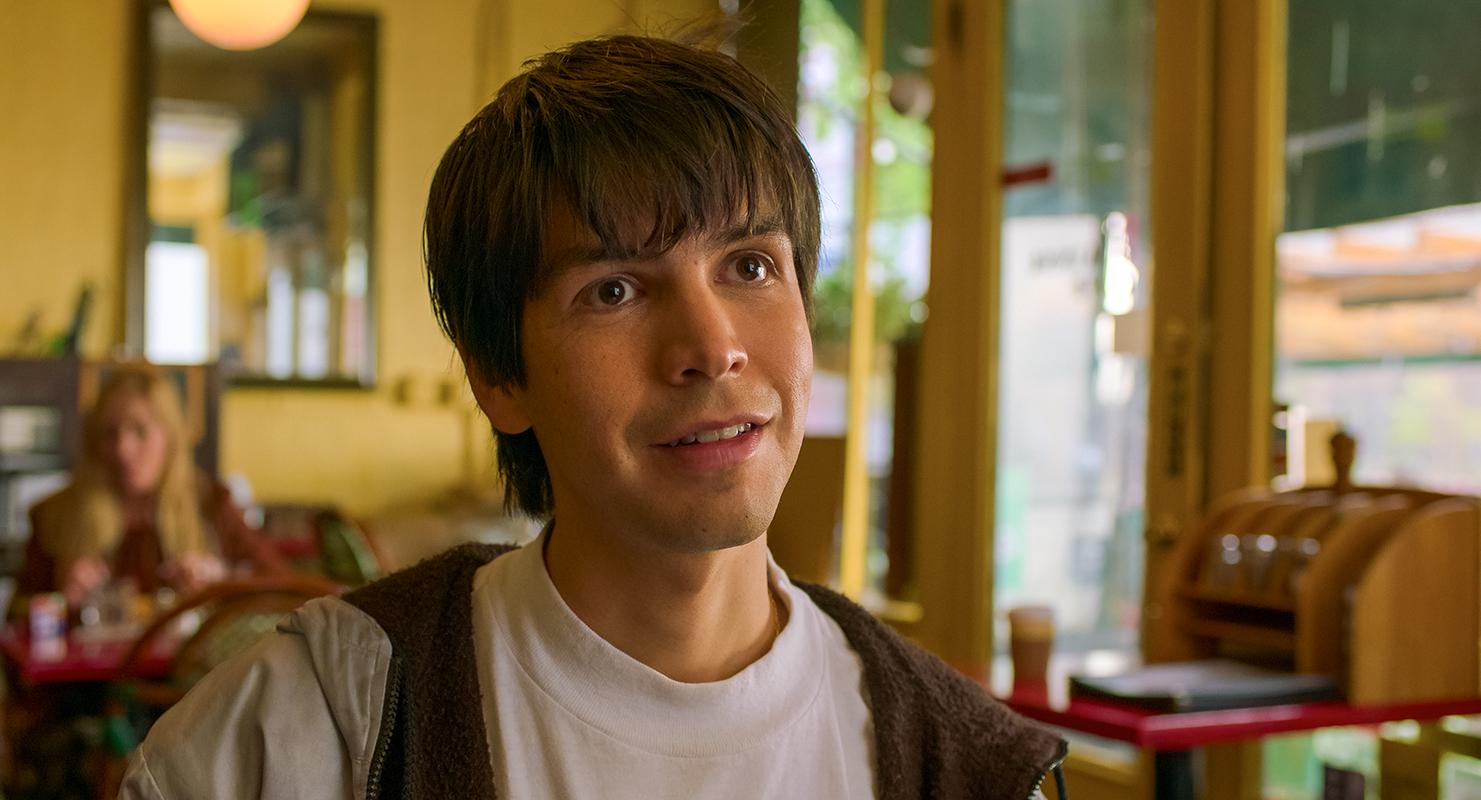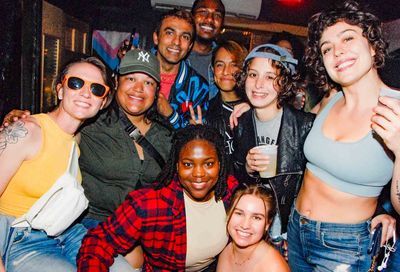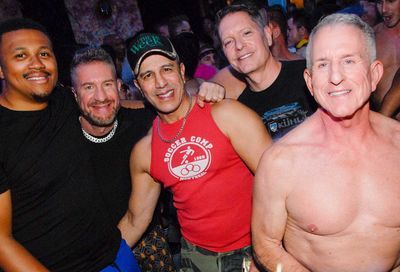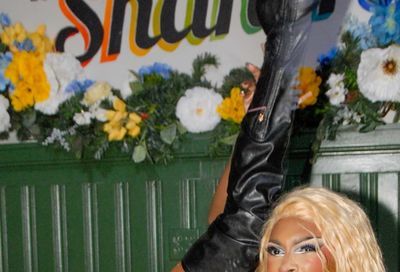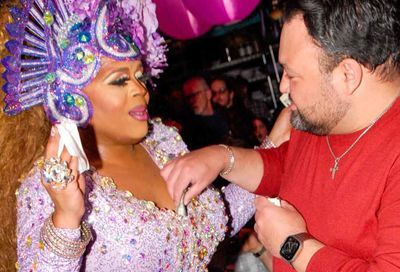World Wonder
Lynda Carter talks about her new album, her upcoming show at the Kennedy Center and the importance of gay rights
While it may be four decades since her iconic character first twirled her way across American television sets, when Lynda Carter flashes her smile at you today it’s impossible not to see the Wonder Woman within.
And given her status as an icon for a generation of gays and lesbians — admit it, you’ve done the twirl, and likely more than once — there’s a certain level of cultural satisfaction in hearing her speak about gay issues.
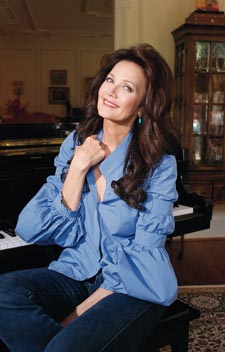
Lynda Carter
Carter certainly isn’t afraid to share her opinions.
”If another guy said you were gay, you could get thrown out of the military, just someone suspecting you,” she says, recalling the early days of the Clinton administration when the notorious ”Don’t Ask, Don’t Tell” military policy became law. ”It was linked to all the crazy, far-right stuff.”
Having seen the ”brilliant” Lt. Dan Choi, the West Point graduate and Arabic-speaking linguist recently discharged under DADT, Carter decries the loss the policy is wreaking on the military and the previous administration’s ”pandering to the far right” that’s made gay issues such a political football.
”I’m a very spiritual person and I have investigated a lot of different faiths. I’m married to a Jewish man, I bar and bat mitzvahed my children, I was raised Catholic, my father is a Mormon, my sister is an Evangelical,” she says. ”This is a nation that has no business regulating religion because it’s going to leave someone out and it ends up being tribal. There’s no difference from [the] far right to any tribal group you see in Third World countries.”
And that’s all before the interviewer asks the first question.
Sitting on a couch in her Potomac, Md., home, Carter seems infinitely at ease with herself and her life. Signs of her status as a cultural icon are few — a Wonder Woman telephone atop a desk filled with family photos, a Wonder Woman Pez dispenser nestled among a variety of knick-knacks in a tasteful display case — and speak to a balance between her role as a superhero and her life as Lynda Carter.
While Carter has never completely left the entertainment business, with her two children now in or nearing college she’s finding herself re-energized as a performer. Her new album, At Last, debuts on June 9, and she’ll take the stage at the Kennedy Center for two nights on June 12 and 13.
”These guys are really good, it’s a really good band, it’s a really tight show and we’ve worked really hard at it, so it’s fun,” she promises. ”You’ll have fun.”
Then she flashes that Wonder Woman smile and you just know you will.
METRO WEEKLY: I need to get this out up front: I grew up with Wonder Woman and I loved it. I’m assuming I’m not the first gay guy to tell you, ”I spent a lot of time twirling around when I was a kid.”
LYNDA CARTER: It’s kind of like being a country/western star. If you are liked by the gay and lesbian population, you’ve really made it. It’s like that kind of loyalty. I think part of the appeal is the secret self of Wonder Woman. The secret’s out — the one that other people can’t see, the whole of you. The far right breeds intolerance and it’s all fear based. I just want to know, what are they afraid of?
MW: What do you think they’re afraid of?
CARTER: The same reason they want everyone to believe their way. It’s not a threat to them in any way. They don’t have an understanding. I have great faith in people. If people come to know and understand where that all comes from, and from such an early age [then they understand]. Almost every person I’ve gotten to know that is gay or lesbian knew from an early age. And, particularly with Wonder Woman, I hear it a lot: ”Here’s someone that makes me feel powerful, that makes me feel free, that can beat up the bad guys.”
MW: And look really fabulous while you’re doing it. Do you ever get tired having people looking at you and thinking of you as Wonder Woman?
CARTER: It is really synonymous almost, I think.
MW: Have you ever gone through periods where you’re like, ”God, I just want to be Lynda Carter”?
CARTER: I’ve tried to use it as a vehicle to connect other people. How else would you know something about a person’s childhood just meeting them briefly? So I have always made an effort to embrace Wonder Woman. It’s not always been easy, particularly if I’m looking very ragged or I’m fat or I’m disappointing [to people].
MW: In the past couple of decades all the big superheroes, in particular ones from TV, have been reinvented for the big screen multiple times. We’ve had multiple Batmans and Supermans, but you’re still Wonder Woman. There’s not been someone else who stepped into that role.
CARTER: Not for lack of trying.
MW: Why do you think Wonder Woman hasn’t made that same leap that the other iconic characters have?
CARTER: You know, it’s an odd thing. I think they try too hard with the scripts. They think it’s about this superpower. And it’s really not against men, it’s for women. It’s a dual role in which she needs to connect with the audience. One of my main goals for the character was Diana Prince, who had to connect and share the secret with the audience. I said, ”I don’t want to play dumb. I don’t want to be dumb and goofy.” It’s that secret self that morphs, so yes, she does have to keep a lid on it.
You can’t play a superhero. You can’t. You look ridiculous if you do. You look like a cartoon, like Mighty Mouse or something. So I think they’re right if they haven’t come up with the right script that it shouldn’t be done. [But] the baton needs to be passed, so to speak.
MW: You would like to see someone else take on the role?
CARTER: Absolutely. It needs to be done again. It needs to be done again and again and again, even if it’s with different people. It’s a great story and I think it has all the potential in the world. But it can’t be about the bad guys and the good guys. It has to be about relationships within the story.
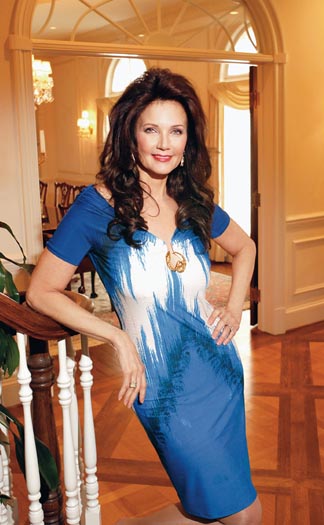
MW: You were Miss World USA….
CARTER: Aaarrrggggh. [Laughs.]
MW: I wanted to ask you about it because Carrie Prejean, the Miss California USA, has been in the news. What do you think about her and the controversy about her statements during the pageant against same-sex marriage?
CARTER: She’s within her rights to do that. It’s a free country. And I’m not going to demonize her. She’s just misinformed. She doesn’t get it. She doesn’t know the mind of God.
That’s another thing that really kills me. God is omnipotent, the Bible is supposed to be the word of God, then you can’t pick and choose what it is you want him to be absolutely right about. It also says in there that you can beat your wife. There’s a lot of bizarre stuff in there. You just can’t have it all. You just can’t pick what it is you want to be the truth. If you want to be a televangelist, fine. You want to talk about faith and glory of God and all the rest of it, great. That’s freedom of religion. But taking my freedom away by moralizing and judging, if that’s the God they believe in, I don’t want any part of it. It’s astonishing to me that the most judgmental people seem to be those who think they speak for God.
MW: You were raised Catholic?
CARTER: I went through my born-again phase. I didn’t convert to Judaism [when getting married] but my faith is just –. I think it’s more what I don’t want than what I do want. I don’t know what it is I really believe in. I believe in all of it and none of it.
MW: You kind of amalgamate a little bit from a lot of different things?
CARTER: Yes. When it deals with loving, freedom, with personal connection, it’s your own spirituality. You’re the only one who can speak for whatever yours is and you can’t put it on someone else. I don’t get why people are so threatened [by same-sex marriages] — it preserves the institution of marriage. All you have to do is ask someone why they got married. That’s what I want, too — to commit myself before myself and God, you know, to have security and family.
To me the marriage thing is different from living with someone or being a partner. Because a heterosexual couple can be [unmarried] partners just as much. And when people get married after a long time together, it either works beautifully or it blows up right away, you know? Either they feel confined or they feel connected. And it’s the same for all of us.
MW: How long have you been married?
CARTER: Twenty-five years.
MW: How did it change your relationship when you got married? Was it that you felt closer, that you felt more responsibility?
CARTER: I’m not sure that I’ve ever been able to pinpoint what that is. It changes in so many ways. It’s either connected or consigned — that you’re marching through this life together, that if there’s an argument you find the way through it more easily. You have to. And you have to take the option of divorce off the table. Accountability, responsibility. [Problems are] usually a lack of communication. I always think my husband can read my mind.
MW: When I mentioned the Miss World….
CARTER: I went right past it.
MW: Yes.
CARTER: It’s another label. It wasn’t a great experience. It was a million freakin’ years ago. It’s so long ago it’s stupefying. It had its place in my life, [but] it’s nothing I aspired to. I totally fell into it. I don’t feel it was any accomplishment. I don’t feel that there was any substance. What is it that Horace Greeley said, ”Fame is a vapor…only one thing endures and that is character.” That’s the reason. It’s cool but it doesn’t have any substance. It’s a vapor.
MW: Obviously, you’ve had a big role in how people see women as both feminine and powerful, so how do you view beauty pageants today?
CARTER: My experience was an unhappy one to some extent because of the focus. There wasn’t even any talent portion in Miss World. The thing I hated about it, after I won Miss USA, all these girls I’d spent a week with, the pageant people just disappeared them. Even the former Miss USA, they didn’t want her in the same elevator as me. So I kind of butted heads with them. I didn’t like that about the disregard, how humiliating. And I experienced the other side, in the Miss World pageant in London — I think Miss Australia won — and they did the same thing. It really didn’t matter to me. I had already been on my own, singing all over and everything.
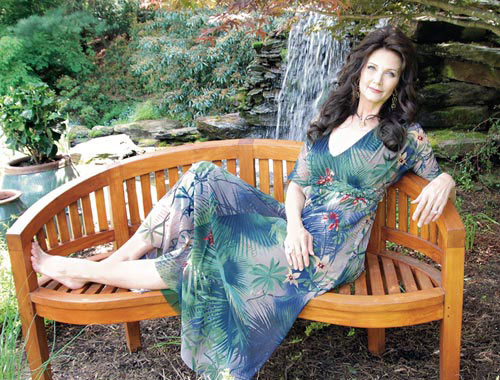
Lynda Carter
MW: You’ve been a TV star in L.A., and you’ve done the celebrity thing. How is it living in the D.C. area?
CARTER: It’s great! When I met [husband Robert Altman], I was so ready to have a life with more substance. I don’t think that is dissimilar to the experience of many people, whether it’s the celebrity scene, the gay scene, the party scene — you grow out of it and you want substance in your life. And you want your partner, someone to walk that walk with, and a family and stability with friends and people that edify you. Not just people who want something from you.
My husband very wisely said, ”Lynda, you’ve worked so long to have this career. It’s not so easy to bring it back.” So I did a couple of series that really didn’t work but I did a lot of TV movies so I always stayed in it somehow. Probably my least favorite thing to do is to take pictures and do publicity.
MW: But you’re obviously good at it.
CARTER: I’ve done enough of them. I have never really enjoyed that. I don’t know that there are any people in the public eye that really enjoy photo shoots.
MW: The only people I know that really seem to enjoy the photo shoots are models. Models always know they look good.
CARTER: That’s their profession. I think part of it is I’m out of practice. I really took a long time off from that kind of thing. It’s just, after you’ve been in it as long as I have, it’s like you’re so sick of yourself you could vomit. That’s why I don’t like anyone to read their questions to me in an interview. It’s much more interesting to be curious.
My whole life people wanted me to be a beauty queen, a Wonder Woman, a mom, a this and a that, these genre boxes. You’re not gay, you’re a man — you’re Sean and you’re also gay. It’s just a piece of what you do. You run this magazine. You’ve got this creative side. You’ve got this home life. You’ve got a family where you came from, you’ve got a hometown, you’ve got your sports, you’re a whole shuffle. You happen to be passionate about an issue. That you have to argue the point drives me nuts. Men also have a hard time dealing with this: You are not what you do. You’re so much more than what you do.
MW: You’re going to be performing at the Kennedy Center. What do you get out of performing live?
CARTER: It’s like if you’re a baseball fan being able to play a game. It’s thrilling. It’s like too much fun to have someone pay to see it. It is a high-wire act in that you have to be on your game, so there’s that edginess to it and you never know what’s going to happen. I have a general idea what I’m going to say, but the audience sometimes feels so comfortable that they start talking to me. So it’s a little irreverent, we do irreverent things and sexy things and I’m hopefully not all full of myself. It’s not just a bunch of standards, old music or anything. These guys are really good, it’s a really good band, it’s a really tight show and we’ve worked really hard at it, so it’s fun.
I’ve never felt as good about anything as I do about what I’m doing now musically. I just am appreciative of it and I know what I want to do. What happens within a song is that it can go in a lot of directions but it still has a structure. And I work hard in getting the structure in a way that has got the maximum amount of freedom in it.
MW: Can I ask you something that’s completely different than that? During the photo shoot we did earlier, you were talking about the lighting and you mentioned that when you were younger you didn’t care about what angles you were shot from and such, but things are different now. Does aging put pressure on you?
CARTER: It’s just strange and I think it’s strange for everyone. Aging is a weird thing because you mature as a human being — hopefully you mature, or you’re just a jerk. It feels like there’s very little in between. Unless you’re working on being understanding, you end up angry and not very much fun to be around. Now, I think I look good for the age I’m at. And for me, this is what it looks like. I’m perfectly comfortable not having any makeup on and having my hair in a ponytail or whatever.
It is what it is and I’m going to have as much fun as I can. One of the best compliments I ever had, last year when I did the Kennedy Center, some women I’ve known a long time said, ”Seeing you up there, I know I can do it too. Not singing onstage, but my kids are gone and I’m not folding up to die.” I’m not folding up and just being a middle-aged. I’ve got a lot of pizzazz left in me.
MW: You’re not that old.
CARTER: You know what I’m saying. That was the right thing to say, by the way. [Laughs.]
MW: I noticed that you have a tennis court and on your picture wall you have photos of you with Martina Navratilova and Chris Evert. Those were two of my childhood idols, along with Wonder Woman.
CARTER: I’ve known Chris for so many years and Martina as well. Chrissie is one of the most irreverent people that you will ever meet. She’s got a wicked sense of humor. The soft one is Martina. She is just a mush. She is so loving and kind. I’m not saying that Chrissie isn’t loving and kind, but she has a wicked sense of humor.
MW: Do you play?
CARTER: I hit the ball. I’ve taken a zillion lessons. If you put a camera on me, I would look fantastic. If you were looking where the ball went, not so much. One time I said, ”Chrissie, I want you to just hit the ball to me. I just want to see what it feels like to get a ball off your racquet.” She said, ”Okay, I’ll tell you what. If the ball touches any part of your racquet you get the point. It doesn’t have to be returned. If it just clips it anywhere you get the point.” Well, I didn’t beat her. It’s fast!
MW: One thing I regret in life is that I quit playing for about 15 years and didn’t get back into it until I was older. You can’t do the same thing at 35 that you could at 18.
CARTER: If you’re an athlete, you’re an athlete and you’re always an athlete. If you have the hand/eye coordination, you are still able. That training and the synapses that were created in your brain, you’d be good at shooting. I love to shoot. I’m for gun control all the way, but I like to shoot clays, trap, skeet — all that stuff.
MW: Did you shoot when you were growing up?
CARTER: No, I only learned when I moved here. There were a couple of people who did it and they said, ”Oh, try it.” And I said, ”I don’t want to shoot a gun.”
MW: You’re the only person I know who learned to shoot after they came to D.C.
CARTER: Well, it’s not pistols, it’s an over-and-under shotgun. I like the whole idea. ”Pull!” It sounded so upper-crusty.
MW: It’s also rednecky, so you get both.
CARTER: Well, I only like the gentlemanly stuff. I would never kill an animal.
MW: Are you the type of person who knew you were going to be famous later on?
CARTER: I always knew I would sing and I always knew I would act. I believed that I would be famous. Some people say it’s all about the work. Well, that’s true, but I knew that the best way for me to get more work was to be famous. I knew I needed publicity. I knew I had to market. All these years later, the same rules apply. But, once again, it’s much more about the work. That’s the focus. That’s why I don’t like to do all the other stuff, but I know I have to do it. And I do it with a good heart.
At Last is available Tuesday, June 9; for information visit www.lyndacartersings.com. ”An Evening with Lynda Carter” is June 12-13 at the Kennedy Center Terrace Theater. For tickets and information visit www.kennedy-center.org or call 202-467-4600.
Support Metro Weekly’s Journalism
These are challenging times for news organizations. And yet it’s crucial we stay active and provide vital resources and information to both our local readers and the world. So won’t you please take a moment and consider supporting Metro Weekly with a membership? For as little as $5 a month, you can help ensure Metro Weekly magazine and MetroWeekly.com remain free, viable resources as we provide the best, most diverse, culturally-resonant LGBTQ coverage in both the D.C. region and around the world. Memberships come with exclusive perks and discounts, your own personal digital delivery of each week’s magazine (and an archive), access to our Member's Lounge when it launches this fall, and exclusive members-only items like Metro Weekly Membership Mugs and Tote Bags! Check out all our membership levels here and please join us today!




